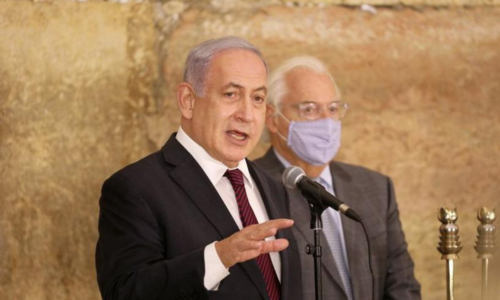MANY have hailed the recent US-brokered Israel-UAE accord as a glimmer of hope in the violent and complex region of the Middle East. But despite its broad appeal to strengthen economic and cultural ties between the two countries, it fails to address the Palestinian question, hence dampening all hopes of this document becoming a global template for future agreements of Israel with countries including Pakistan, Bangladesh and Indonesia.
The Gulf Cooperation Council (comprising six Middle Eastern monarchies) endorses and stands behind this accord. Historically, GCC members have been strong supporters of the Palestinian cause, and their sympathies with the same are unconditional. So why has the GCC decided to change course now?
The major blame for the GCC’s frustration with the Palestinian leadership can be attributed to the power struggle between Hamas and Fatah and their past allyship with key GCC rivals such as Saddam Hussein’s Iraq, Iran and the Muslim Brotherhood. But this agreement lays the foundation of a united alliance against Iran and its proxies within the Middle East. With America’s blessing, the GCC has adopted a new multipronged strategy aimed at intensifying the pressure on Iran. First, they plan on engaging the European countries to dismantle Hezbollah’s influence in the Middle East. This would be supported by full and unconditional logistical support of Israel that would be ready to go to extremes to settle its long-running feud with Iran.
Following the Iranian threat is the anxiety of GCC members over the incoming Biden administration in the United States. There is high anticipation that the Biden administration would hold the GCC monarchies accountable over their track record of violating human rights, whether it be war crimes in Yemen, freedom of speech at home, alleged terrorist financing or the lack of religious freedom. If this escalates, it could well see an internal regime change or perhaps a pathway to a controlled democracy.
The GCC has adopted a new strategy to increase pressure on Iran.
Similarly, with the departure of Donald Trump, Israel will be losing one of its greatest allies and would be in need of a strong collective bargaining agreement from within the region to manage the new president’s administration. A formidable GCC alliance with Israel and India would garner enough support in the US Congress to retain the existing status quo until a major global crisis takes place and their geopolitical stature is restored.
Apart from these external threats, a crash in the global resource and service industry (primarily tourism) has left every member of the GCC in a major economic crisis. With overpriced real-estate projects that were financed by now cash-strapped banks, coupled with state enterprises including luxury airlines posting massive losses, GCC members desperately need help in terms of liquidity and investment. The recent withdrawal of cash deposits from Pakistan followed by massive lay-offs in the ranks of the construction-related labour force in the Gulf is nothing more than a reflection of the GCC’s staggering financial stress and over-leveraged economy. However, to attract investors in the GCC, the volatility in the region has to decrease and GCC members will be forced to curtail their notorious interference in the internal affairs of their neighbours.
With these regional developments, some analysts insist that Pakistan should accept Israel and reap numerous benefits related primarily to its ties with the US. However, Pakistan’s recent history, trust deficit and interactions with the US indicate that the country’s relationship with the US will remain transactional for the foreseeable future, and any further capital investment or technological transfer to Pakistan would require enhanced due diligence with the balance of power always favouring India.
Whatever the case, while GCC members, including those that are home to the most sacred cities for Muslims, are seeking the patronage and protection of Israel, perhaps they should be looking closely at poverty-struck Afghanistan, where ill-equipped, barefooted Afghans, recently handed the majestic global superpower its first decisive defeat of the 21st century. Members of the GCC must learn to be self-reliant when it comes to matters of defence, embrace open societies, and abolish the centuries-old tribal form of governance that still exists.
Pakistan and Bangladesh should expect Israel to come bearing an olive branch, as it is aware of the large population, women’s empowerment, exuberant youth and the abilities of these nations. Yet hopefully, the price of Pakistan’s acceptance of Israel will be significantly higher than that of the member states of the Gulf Cooperation Council and would include a clear pathway to the independence of the glorious land of Palestine.
The writer is an international banker based in Toronto.
Published in Dawn, December 23rd, 2020














































